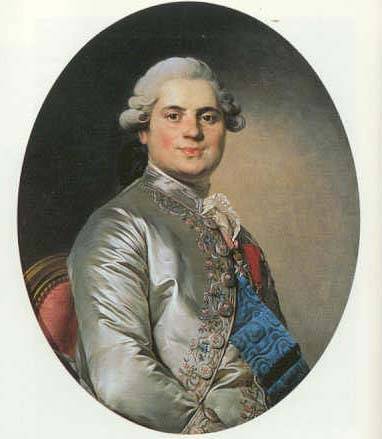The marriage between Louis XVI and Marie Antoinette has been scrutinised intensely from their very wedding day. The unconsummated marriage fuelled speculations for years until the queen finally delivered an heir but even the queen's enemies agreed that they possessed genuine affection for one another as they grew older.
In contrast, the union between the king's younger brother, Louis Stanislas Xavier, and Marie Joséphine of Savoy was far less amiable.
The wedding of Monsieur (as the elder of the king's younger brothers were known) was set for 14 May 1771. Once the bride arrived at court, the bridegroom was intensely disappointed. The new Madame was not particularly beautiful and her personal hygiene left a lot to wish for. For instance, she was known to rarely brush her teeth, her eyebrows were not plucked, and she did not indulge in perfumes to hide the fact that she rarely washed.
Finding her deeply unattractive, Louis Stanislas was also horrified at her lack of understanding of the French courtly routine - and did nothing to help her integrate herself in her new life. As for Marie Joséphine, she likely was not impressed with her spouse either. The Comte de Provence had the typical Bourbon appetite which had left him very obese, to the point that he waddled when he walked.
 |
| Marie Joséphine |
So, the stage was not set for a happy union but initially it was not entirely hopeless. The couple lived together, as was expected, and shared a fondness for intrigue. Both were dominating personalities who liked to have the last words - quite an explosive combination. Yet, there was one blot on the marriage which caused immense frustration. The marriage was - like that of his brother's - unconsummated. It is widely speculated that Louis Stanislas was impotent although he enjoyed boasting that he and his wife enjoyed a vivacious intimate life. The couple would never have any living children; Marie Joséphine's two pregnancies both resulted in miscarriages.
In the first years of the marriage, they lived rather secluded but together in a calm co-existence. While their relationship does not appear to have been very romantic, they did get on well enough to avoid any scandal. For instance, it was not unusual for the Comtesse to accompany her husband when he went to their various estates. There, they could peacefully indulge in their shared passion: undermining Louis XVI and Marie Antoinette. Both Louis Stanislas and Marie Joséphine were deeply opposed to their new king and queen; as the years wore on, their dislike grew into actual hostility. This might have acted as a common interest between them and appear to be one of the few points in which they actively cooperated.
For once, there is a direct insight into the feelings of one of the parties involved. As the Comtesse de Provence wrote to her friend, her husband might be the master of her house, but he was not the master of her heart - "he has never had it". Thus, she seem quite openly to admit that she has never had any romantic feelings for her husband.
 |
| Louis Stanislas |
Until 1780, the couple maintained a distanced but accepting relationship but things were about to change. The Comtesse de Balbi entered into the household of the Comtesse de Provence and immediately attracted the attention of her mistress' husband. The two began an affair which lasted throughout the next decades. Understandably, this spelled the end for any outright affection between husband and wife and left them with a relationship in which they tolerated one another.
Interestingly, Marie Joséphine was rumoured to stray from her marriage as well - but not to a lover. She was speculated to indulging in a lesbian affair with Marguerite de Gourbillon. Whether true or not, is not known, as female homosexual relationships were entirely taboo. Either way, it was painfully obvious that the two did not share any sense of intimacy or special loyalty towards one another.
When the revolution broke out, the couple was successful at escaping France - but their marriage did not survive. Whereas they had hitherto made do with a distanced relationship, they now settled in two different countries. The Comte de Provence headed for the court of Paul I of Russia, the Comtesse went to Schleswig-Holstein - and she took the Comtesse de Balbi with her. That was indeed her prerogative as she had maintained her husband's mistress in her own household. Even when he was proclaimed Louis XVIII, it took many years for the two to be finally reunited.

No comments:
Post a Comment